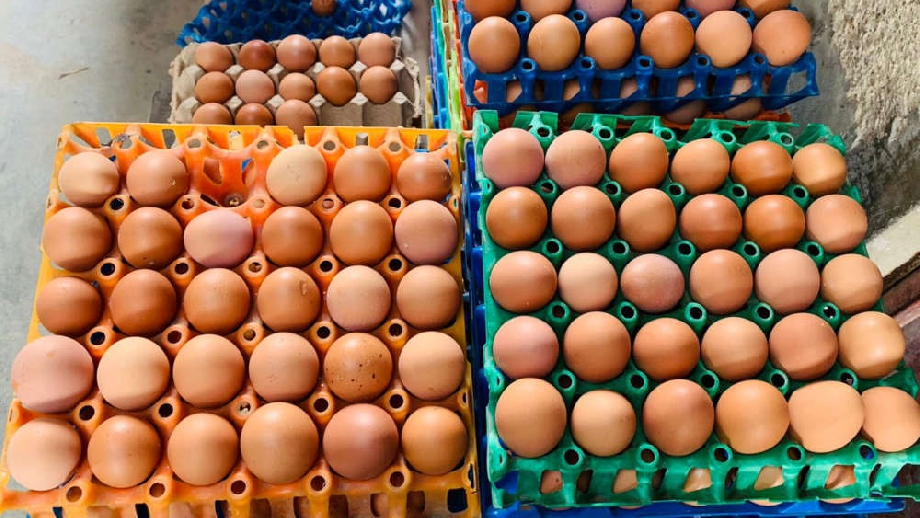
The rising cost of eggs has been attributed to soaring prices of bird feeds, transportation and the rainy season, among other factors.
A market survey by our correspondent reveals a steady rise in egg prices over the past several months. In April and May, a crate of eggs was priced between N3,000 and N3,500, with a single egg sold at N150. By June, prices had increased to around N3,800 to N4,000 per crate, while a single egg rose to N200 — a 25% jump in just one month. As of October, prices surged again, with a crate now costing between N5,500 and N5,700 and a single egg retailing at N250 and N300.
The Poultry Association of Nigeria (PAN) had earlier warned that if urgent steps are not taken to support poultry farmers, egg prices may increase from the current N5,500 to N10,000 per crate. The Secretary of PAN, FCT Chapter, Musa Hakeem, spoke during a press briefing to commemorate World Egg Day in Abuja.
Stakeholders Speak
Speaking on this, an egg distributor, Tosin Aremu, attributed the rising price of eggs partly to reduced production during the rainy season. In an interview with our correspondent, Mrs. Aremu explained that chickens need a balance of water and sunlight to lay eggs. Still, the rainy season disrupts this balance, resulting in lower productivity. She said, “Before they can lay eggs very well, they need water and a lot of sun, but this rainy season weather is really affecting and contributing to the low production of their laying on the farm right now.”
Mrs. Aremu added that “some chickens have even caught diseases during this season and are not able to lay eggs.”
Similarly, a Poultry farmer, Joseph Ojo, said the rising prices of eggs are primarily due to the soaring cost of feed. Mr. Ojo lamented that the price of a bag of feed had risen sharply from 7,000, to 13,000, and now to 26,000 naira. “The major factor is their feed. Feed prices have become very high,” he explained.
He also pointed out that rising fuel prices have increased farm operating costs, which has further contributed to the hike in egg prices. He said, “Now the hike in fuel prices also affected the cost because the millers need fuel to run and also transportation to the farm.”
Addressing the Challenge
This continued rise in egg prices highlights how basic goods are getting more expensive, adding extra pressure on household budgets.
To address this challenge, agricultural economics expert Professor Olufemi Adesope called on the governments to support poultry farmers with access to feed at lower costs. Professor Adesope, who is a lecturer at the University of Port Harcourt, recommended other measures such as, incentives, relief packages, low-interest loans, and grants to alleviate the financial strain on poultry farmers.
“Local, state, and federal governments could help poultry farmers access feeds at very low costs and one way they can do it is through bulk purchasing programs, they can also do it through subsidizing the cost of feeds,” he explained.
He further said the costs of feed constitute a major part of poultry production expenses. “70% of production in poultry generally goes for feed,” he explained.
Professor Adesope also spoke on the government’s role in addressing the rising cost faced by poultry farmers. He said, “Incentives for local feed production would help greatly. Another very important one is tax breaks, low-interest loans or grants to farmers, especially those operating on a very large and commercial scale.”
Professor Adesope also spoke on alternative farming methods to help reduce production costs. “There is an insect technology called black soldier fly, which we have been researching for the past four years with remarkable results. If we concentrate more on this, we can attract and domesticate these insects, then process and serve them as live feeds for birds and fish."
He added that “cassava peels, leaves, cassava products generally, can serve as alternative forms of feed.”
The Agricultural expert also listed precision farming as another method to help address the issue of increasing costs of production for farmers, explaining that, “for commercial-scale farmers involved in poultry production, providing technology for automated feeders, temperature control systems, and real-time monitoring, artificial intelligence, internet of things (IOTs) and censors can help them. These are adaptable technologies that can be applied.”
Professor Olufemi also suggested that small-scale poultry farmers can play a role in mitigating the rising cost of eggs by forming cooperatives. “If they can form cooperatives, pull their resources together and purchase in large quantities, it will reduce the overall cost of feed and equipment.”
Long-Term Solutions
Although the current hike in the price of eggs requires urgent measures, there is a need for a long-term solution that Nigeria can adopt to improve the resilience of the poultry sector and prevent future price hikes. Speaking on this, Professor Adesope suggested that the government invest in local production of ingredients for feed, such as maize and soybean. “We grow a lot of maize in Nigeria and farmers need support. If the government can grant them the needed support, the reliance on import will reduce to a great extent,” he said.
The Agricultural expert also called for “investment in scientific research and development. Scientists can look at the leaves we have and see how they can serve as better alternatives.
“We need to provide training and capacity building to poultry farmers so that they can know more about these modern and innovative practices to manage birds, control diseases, and entirely manage the farm,” he explains, adding that “this will help enhance efficiency and sustainability.”


